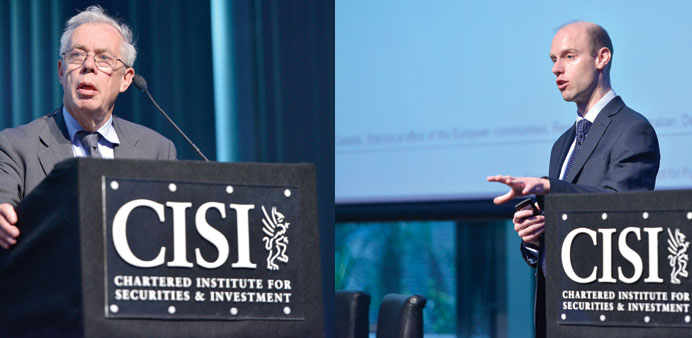By Denise Marray
Gulf Times Correspondent
London
At the Annual Conference of the Chartered Institute for Securities & Investment (CISI), ‘The Wealth of Nations – A World of Opportunities and Threats’, there were some hard hitting remarks made by Professor John Kay, Visiting Professor, London School of Economics who spoke of the ‘misplaced pride’ of people working in financial services.
He was critical of the insular world within the City of London where people trade with each other in a bubble and transactions are prized more than relationships.
He described this phenomenon over a decade ago in his Kay Review of the Equity Markets and Long Term Decision Making, when he observed: “In equity markets today we observe high volumes of trading between individuals – or computers – who deal anonymously with each other, and know little or nothing about the activities of the companies whose shares they trade.
It is hard to see how this activity could contribute much to well-judged capital allocation between corporate activities or to good governance in the corporate sector, and we found no reason to think that it has done so. Nor can such a trading environment generate the information needed either to make good long-term decisions in companies or to assess whether good long-term decisions have been made.”
The main function of markets he said is to create liquidity for fledgling companies as large, listed companies are self-financing.
“Equity markets are one of the means by which investors who support fledgling companies can hope to realise value. Equity markets provide a means of oversight of the principal mechanism of capital allocation, which takes place within companies.
Promoting stewardship and good corporate governance is not an incidental function of equity markets. The effectiveness of modern equity markets depends almost entirely on their effectiveness in promoting these goals of stewardship and governance.”
He called for financial experts to offer informed guidance rather than simply showering clients with masses of information. “Most people outside of the financial world do not want reams of information – they want honest advice,” he pointed out.
In his view: “Finance can contribute to society and the economy in four principal ways. First, the payments system is the means by which we receive wages and salaries, and buy the goods and services we need; the same payments system enables business to contribute to these purposes. Second, finance matches lenders with borrowers, helping to direct savings to their most effective uses. Third, finance enables us to manage our personal finances across our lifetimes and between generations. Fourth, finance helps both individuals and businesses to manage the risks inevitably associated with everyday life and economic activity.
“These four functions – the payments system, the matching of borrowers and lenders, the management of our household financial affairs and the control of risk – are the services that finance does, or at least can, provide. The utility of financial innovation is measured by the degree to which it advances the goals of making payments, allocating capital, managing personal finances and handling risk.”
Capital allocation in the modern economy, he said, is essentially about housing. “It’s not a difficult business; it used to be done competently by people who left school at sixteen and worked in building societies. Today mortgage lending has increased in complexity and been made worse.”
With regard to the finance industry reform he commented: “The objective of reforming the finance industry should be to restore priority and respect for financial services that meet the needs of the real economy. There is something pejorative about the phrase ‘the real’ – meaning the non-financial – economy, and yet it captures a genuine insight: there is something unreal about the way in which finance has evolved, dematerialised and detached itself from ordinary business and everyday life.”
He wants to see people within the industry, especially at the top of the chain, taking personal responsibility for their actions. “If you take the bonus – you take the rap,” he said. In his view blame should not be pinned on scapegoats lower down the chain. He expands on these views in his forthcoming book, ‘Other People’s Money: Masters of the Universe or Servants of the People?’
Stephen Cohen, Managing Director, Chief Investment Strategist, BlackRock International Fixed Income and iShares EMEA, spoke on the Economic and Markets Outlook. He noted that China’s economy is slowing and has major deflation. He warned “China is flying with one engine – there is investment but no consumption.” The challenge of turning an investment led policy into a consumption economy was considerable, he said, adding “Keep your eyes on China – a lot more volatility is expected.”
Within Europe, he said, people should look beyond Greece and focus on Italy and France “where a lot more reform is needed.” He described these countries as “very uncompetitive.”
With regard to the Middle East and the oil price drop he noted: “The redistribution effects around the world are positive to India and Korea but bad for the Middle East.”
Concerning the Financial sector he predicted that “it is going to be massively affected by technology which will take out a lot of jobs.”

Kay (left) and Cohen: Hard hitting remarks.
